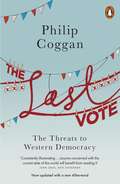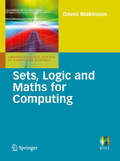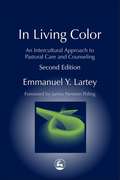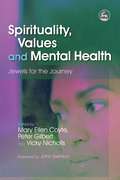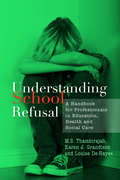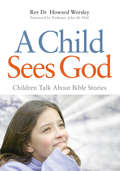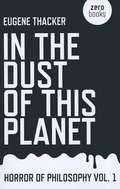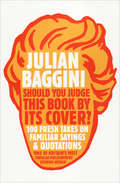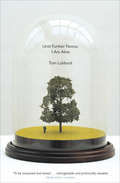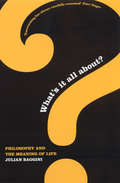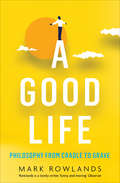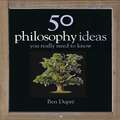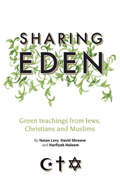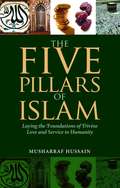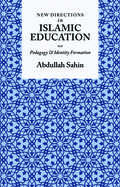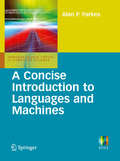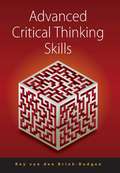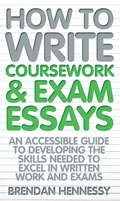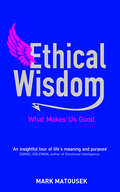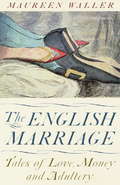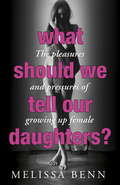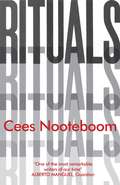- Table View
- List View
The Last Vote: The Threats to Western Democracy
by Philip CogganThe Last Vote is a wake-up call showing why we cannot afford to take democracy for granted, from Philip Coggan, award-winning author of Paper Promises and The Money MachineCan we afford to take democracy for granted? It's now so much a part of our lives that we could be forgiven for thinking it mainly takes care of itself. Almost half the world's population now lives in a democratic state, while some Western democracies have now had universal suffrage for almost a century and have endured through even the most severe of global upheavals. In The Last Vote, Philip Coggan shows how democracy today faces threats that we ignore at our own risk. Amid the turmoil of the financial crisis, high debt levels, and an ever-growing gap between the richest and the rest, it is easy to forget that the ultimate victim could be our democracy itself. Tracing democracy's history and development, from the classical world through the revolution of the Enlightenment and on to its astounding success in the nineteenth and twentieth centuries, Coggan revisits the assumptions on which it is founded. What exactly is democracy? Why should we value it? What are its flaws? And could we do any better?The Last Vote is a wake-up call, and an illuminating defence of a system, which, in Churchill's words, is the worst possible form of government, except for all the others that have been tried. Reasoned, lucid and balanced, Coggan's argument parrots neither the agenda of left nor right, but calls for us all to work together to ensure we don't end up in an even greater mess than we're in today. Finally, he proposes ideas for change and improvement to the system itself so the next vote we cast will not be the last.Praise for Paper Promises:'This book stands way above anything written on the present economic crisis' Nassim Taleb, author of The Black Swan'Bold and confident... This book should be taken very seriously' John Authers, Financial Times'The most illuminating account of the financial crisis to appear to date ... written with a lucidity that conveys deep insights without a trace of jargon' John Gray, New StatesmanPhilip Coggan was a Financial Times journalist for over twenty years, and is now the Buttonwood columnist for the Economist. In 2009 he was named Senior Financial Journalist in the Harold Wincott awards and was voted Best Communicator at the Business Journalist of the Year Awards. He is the author of The Money Machine, and Paper Promises, winner of the Spears Business Book of the Year Award and longlisted for the Financial Times Goldman Sachs Business Book of the Year Award.
Sets, Logic and Maths for Computing
by David MakinsonThis easy-to-follow textbook introduces the mathematical language, knowledge and problem-solving skills that undergraduates need to study computing. The language is in part qualitative, with concepts such as set, relation, function and recursion/induction; but it is also partly quantitative, with principles of counting and finite probability. Entwined with both are the fundamental notions of logic and their use for representation and proof. Features: teaches finite math as a language for thinking, as much as knowledge and skills to be acquired; uses an intuitive approach with a focus on examples for all general concepts; brings out the interplay between the qualitative and the quantitative in all areas covered, particularly in the treatment of recursion and induction; balances carefully the abstract and concrete, principles and proofs, specific facts and general perspectives; includes highlight boxes that raise common queries and clear confusions; provides numerous exercises, with selected solutions.
In Living Color: An Intercultural Approach to Pastoral Care and Counseling Second Edition
by Emmanuel Y LarteyThe meaning of pastoral care in modern multicultural societies is challenged and reexamined from a pluralistic, global perspective in this book. Emmanuel Lartey stresses the importance of recognizing different cultural influences on individuals in order to effectively counsel, guide and empower them. He provides a clear and concise history of pastoral care and considers its relationship to different models of counseling and spirituality. This new edition has been updated to reflect postmodern and postcolonial studies and provides illustrations of how an intercultural approach can work in practice. Theological teachers and students will welcome its return as an indispensable introduction to the field of pastoral care. In Living Color is an essential source of inspiration to leaders from any religious stream who wish to provide pastoral care in a way that reflects their community's cultural diversity. This book is also a useful resource for practitioners in a wider range of caring contexts who work in multicultural environments.
Spirituality, Values and Mental Health: Jewels for the Journey
by Nigel Mills Paul Chapple Luftha Meah Sarajane Aris Thurstine Basset Abina Parshad-Griffin Chris Mackenna Christopher Newell Wendy Edwards Kim Woodbridge Mary Ellen Coyte Barbara Pointon Ali Jan Haider Mark Bones Paul Grey Anne Roberts B Spalek Frances Basset Tom Gordon Julia Head Ju Blencowe Veronica Dewan Bill K. W. M. Fulford Cameron Langlands Neil Thompson Arthur Hawes Brian Thorne Fatima Kassam Peter Bates Vicky Nicholls Peter Gilbert David Mitchell Choman Hardi Premila Trevedi Andrew Powell Fozia Sarwar Sarah Carr Suman Fernando John Foskett John Swinton Azim KidwaiSpirituality, religious belief and inclusive faith communities are important for mental well being but mental health practitioners have few guidelines for acknowledging these issues when working with service users. Spirituality, Values and Mental Health gathers together personal and professional contributions from mental health professionals, carers and mental health service users and survivors. It addresses the stigma that can surround both mental health and spirituality and explores the place of the spiritual in mental health care, teasing out its implications for research, education, training and good practice. This book is a welcome source of ideas and common-sense that is essential reading for mental health practitioners, carers and service users, chaplains, faith leaders, faith communities, as well as students and professionals working in the field of spirituality and mental health.
Understanding School Refusal: A Handbook for Professionals in Education, Health and Social Care
by Louise De-Hayes Karen J. Grandison M. S. Thambirajah` Combining educational and clinical perspectives, and with extensive use of case studies, the authors present recent research into the mental health problems associated with school refusal, such as anxiety and panic attacks, as well as the role that parental support plays in their children's school life. They also discuss the role of home tuition services and pupil referral units in extreme cases of school refusal, and provides concrete strategies for planning and organising services to manage the problem effectively. Understanding School Refusal is a valuable guide for professionals across the disciplines of education, health and social care, and will also be useful for training courses within these fields.' Education Today School refusal is a crippling condition in which children experience extreme anxiety or panic attacks when faced with everyday school life and this handbook aims to explore and raise awareness of the problem of school refusal in children and young people, and provide plans and strategies for education, health and social care professionals for identifying and addressing this problem. Combining educational and clinical perspectives, and with extensive use of case studies, the authors present recent research into the mental health problems associated with school refusal, such as anxiety and panic attacks, as well as the role that parental support plays in their children's school life. They also discuss the role of home tuition services and pupil referral units in extreme cases of school refusal, and provides concrete strategies for planning and organising services to manage the problem effectively. Understanding School Refusal is a valuable guide for professionals across the disciplines of education, health and social care, and will also be useful for training courses within these fields.
A Child Sees God: Children Talk About Bible Stories
by John Hull Howard WorsleyIn A Child Sees God, Howard Worsley explores how we can all learn from a child's perspective of the world and shows how a child's eye view of the Bible reveals many interesting ideas about ethics and morality, and provides new ways of understanding these ancient stories. By asking families to read Bible stories to their children and discuss these stories with them, recording the ensuing conversations, Howard Worsley offers not only fresh insights into the meaning and significance of these stories but also reflections on how adults can use the Biblical text in the company of children at different stages of development. Following the theory that all stories ever written fall into one of seven categories, this book shows that the themes of the Bible are no different, dividing stories into sections containing texts of wonder, adventure and leadership, terror, justice and judgement, comfort and hope, comedy, and mercy and forgiveness. This fresh look at the Bible through the eyes of children will be a fascinating read for parents, teachers, ministers, and anyone with an interest in child spirituality or ethics.
In The Dust of This Planet (Horror of Philosophy, volume #1)
by Eugene ThackerThe world is increasingly unthinkable, a world of planetary disasters, emerging pandemics, and the looming threat of extinction. In this book Eugene Thacker suggests that we look to the genre of horror as offering a way of thinking about the unthinkable world. To confront this idea is to confront the limit of our ability to understand the world in which we live - a central motif of the horror genre. In the Dust of This Planet explores these relationships between philosophy and horror. In Thacker's hands, philosophy is not academic logic-chopping; instead, it is the thought of the limit of all thought, especially as it dovetails into occultism, demonology, and mysticism. Likewise, Thacker takes horror to mean something beyond the focus on gore and scare tactics, but as the under-appreciated genre of supernatural horror in fiction, film, comics, and music.
Should You Judge This Book By Its Cover?: 100 Fresh Takes On Familiar Sayings And Quotations
by Julian BagginiA philosopher takes a second look at sayings, proverbs, and bits of homespun wisdom: &“Every society needs its guardian of good sense: Baggini is ours.&” —The Financial Times These short, stimulating, and entertaining capsules of philosophy delve into the familiar words that live in our consciousness yet are rarely examined. Should you really do as the Romans do when in Rome and practice what you preach? Is the grass always in fact greener on the other side of the fence, and is there ever smoke without fire? Is beauty always in the eye of the beholder and is it actually better to be safe than sorry? From the popular author of The Pig That Wants to Be Eaten, cofounder of The Philosophers&’ Magazine, and academic director of the Royal Institute of Philosophy, this is a witty, deeply thought-provoking reminder that we should never stop asking questions.
Until Further Notice, I Am Alive
by Tom Lubbock&“These are thoughts for us all, sooner or later—and this is a book I'll keep with me, as long as I live.&”—David Sexton, The Scotsman In 2008, art critic Tom Lubbock was diagnosed with a rare brain tumor and told he had only two years to live. Physically fit and healthy, and suffering from few symptoms, he faced his death with the same directness and courage that had marked the rest of his life. Lubbock was renowned for the clarity and unconventionality of his writing, and his characteristic fierce intelligence permeates this extraordinary chronicle. With unflinching honesty and curiosity, he repeatedly turns over the fact of his mortality, as he wrestles with the paradoxical question of how to live, knowing we&’re going to die. Defying the initial diagnosis, Tom survived for three years. He savored his remaining days; engaging with books, art, friends, his wife and their young son, while trying to stay focused on the fact of his impending death. There are medical details—he vividly describes the slow process of losing control over speech as the tumor gradually pressed down on the area of his brain responsible for language—but this is much more than a book about illness; rather, it's a book about a man who remains in thrall to life, as he inches closer to death. &“I hope that if I am ever diagnosed with a terminal illness I will remember to reread Until Further Notice, I Am Alive. It is, in its tough-minded way, truly joyous.&”—Lynn Barber, Sunday Times
What's It All About?: Philosophy & the Meaning of Life
by Julian Baggini&“Secular-minded readers seeking an alternative to The Purpose-Driven Life have an excellent starting point here.&”—Publishers Weekly For readers who are serious about confronting the big issues in life—but are turned off by books which deal with them through religion, spirituality, or psychobabble, this is an honest, intelligent discussion by a philosopher that doesn't hide from the difficulties or make undeliverable promises. It aims to help the reader understand the overlooked issues behind the obvious questions, and shows how philosophy does not so much answer them as help provide us with the resources to answer them for ourselves. &“Useful and provocative.&”—The Wall Street Journal &“Looking for a clear guide to what contemporary philosophy has to say about the meaning of life? Baggini takes us through all the plausible answers, weaving together Kierkegaard, John Stuart Mill, Monty Python, and Funkadelic in an entertaining but always carefully reasoned discussion.&”—Peter Singer, author of How Are We To Live &“The question of the meaning of life has long been a byword for pretentious rambling. It takes some nerve to tackle it in a brisk and no-nonsense fashion.&”—New Statesman
A Good Life: Philosophy from Cradle to Grave
by Mark RowlandsFramed by the story of a son finding his late father&’s journal, a meditation on love, meaning, and morality by the author of The Philosopher and the Wolf. Myshkin was born on a certain day and died on a certain day—and some things happened to him in between. These things presented him with ethical questions, and this book is a record of his attempt to answer those questions. Discovered in 2054 by his son after Myshkin's death in the Florida Keys, A Good Life is one man's reckoning with the life he has led and the choices he made. It is at once a philosophical handbook for living and a page-turning narrative, following one man's life (birth, death, education, religion, morality, illness, and so on) told through a philosophical lens. It is a riveting examination of the ethical questions we face, and the decisions we must make, and a defense of the idea that at the beating heart of morality we find love. Sometimes profoundly funny, sometimes deeply serious, A Good Life is as readable as a novel and as provocative as the best philosophy. It is the finest work to date by a charming and brilliant thinker. &“A lovely writer, funny and moving.&”—Observer
50 Philosophy Ideas You Really Need to Know (50 Ideas You Really Need to Know series)
by Ben DupreHave you ever lain awake at night fretting over how we can be sure of the reality of the external world? Perhaps we are in fact disembodied brains, floating in vats at the whim of some deranged puppet-master? If so, you are not alone - and what's more, you are in exalted company. For this question and other ones like it have been the stuff of philosophical rumination from Plato to Popper.In a series of accessible and engagingly written essays, 50 Philosophy Ideas You Really Need to Know introduces and explains the problems of knowledge, consciousness, identity, ethics, belief, justice and aesthetics that have engaged the attention of thinkers from the era of the ancient Greeks to the present day.(P)2008 Quercus Editions Ltd
Sharing Eden
by Natan Levy David Shreeve Harfiyah Haleem"Finding common ground between Christianity, Islam, and Judaism is a critical priority for the whole world-and nowhere is that common ground more evident or inspiring than on environmental issues."- Jonathon Porritt, co-founder, Forum for the Future"[A] very encouraging and helpful project, and I hope it inspires those in each of the three traditions to collaborate more in environmental thought."-Sustainability in Crisis, United KingdomThis introductory handbook combines beautiful and enlightening texts from each faith's religious teachings to address some of the most prominent environmental issues faced today, such as waste, climate change, and biodiversity. Each author brings a contemporary focus to the eternal challenge of caring for the environment and provides practical advice on how we can all do our share to protect it.Sharing Eden sets out to show how respect for the environment is at the heart of Judaism, Christianity, and Islam.Natan Levy is the environmental liaison for the Chief Rabbi's Office and the rabbinical expert for the London School of Jewish Studies' Responsibility Unit, both based in the Untied Kingdom.David Shreeve is the director of The Conservation Foundation, which he co-founded in 1982, and the environmental advisor to the Archbishops' Council of the Church of England.Harfiyah Haleem is a trustee of the Islamic Foundation for Ecology and Environmental Sciences (IFEES). She is also the editor of a collection of essays on Islam and the environment and co-editor of the Muslim Green Guide to Reducing Climate Change.
The Five Pillars of Islam
by Musharraf HussainThe Five Pillars of Islam is a comprehensive and practical manual on the fundamental beliefs and practices of a Muslim and provides an understanding of the true spirit of worship in Islam. Written by a noted Muslim scholar and educationist with a contemporary Muslim audience in mind, this is an invaluable reference for every home and classroom.Musharraf Hussain, PhD, is the director of the Karimia Institute in the United Kingdom. In 2009 he was awarded the Order of the British Empire for his services to community relations in Britain.
New Directions in Islamic Education
by Abdullah Sahin"This ground-breaking book is one of the most significant contributions made in recent years to Islamic education."-John M. Hull, University of Birmingham, United KingdomNew Directions in Islamic Education is a radical rethinking of Islamic education in the modern world. It explores the relationship between pedagogy and the formation of religious identities within Islamic education settings that are based in minority and majority Muslim contexts.Dr. Abdullah Sahin directs the Centre for Muslim Educational Thought and Practice and is the course leader for the MEd program in Islamic Education at MIHE in Leicestershire, United Kingdom.
A Concise Introduction to Languages and Machines (Undergraduate Topics in Computer Science)
by Alan P. ParkesA Concise Introduction to Languages, Machines and Logic provides an accessible introduction to three key topics within computer science: formal languages, abstract machines and formal logic. Written in an easy-to-read, informal style, this textbook assumes only a basic knowledge of programming on the part of the reader. The approach is deliberately non-mathematical, and features: - Clear explanations of formal notation and jargon, - Extensive use of examples to illustrate algorithms and proofs, - Pictorial representations of key concepts, - Chapter opening overviews providing an introduction and guidance to each topic, - End-of-chapter exercises and solutions, - Offers an intuitive approach to the topics. This reader-friendly textbook has been written with undergraduates in mind and will be suitable for use on course covering formal languages, formal logic, computability and automata theory. It will also make an excellent supplementary text for courses on algorithm complexity and compilers.
Advanced Critical Thinking Skills
by Roy Van Den Brink-BudgenThis book takes the skills introduced in Roy van den Brink-Budgen's bestselling book Critical Thinking for Students and extends and builds on them. As a result, it will be especially useful for students on advanced level courses, whether in schools, colleges, or universities. It shows how complex arguments can be built up, analysed, and evaluated. It also shows how the use of various types of claim can be approached in argument, by stressing the need to ask a series of questions about their possible significance. The frequent role of explanation in the drawing of inference is also detailed. In addition, it applies Critical Thinking skills to decision-making, showing how these skills can clarify the choices available, their possible consequences, and the criteria needed to make decisions. In short, this book shows how to become an even more active and effective Critical Thinker.
Advanced Critical Thinking Skills
by Roy Van Den Brink-BudgenThis book takes the skills introduced in Roy van den Brink-Budgen's bestselling book Critical Thinking for Students and extends and builds on them. As a result, it will be especially useful for students on advanced level courses, whether in schools, colleges, or universities. It shows how complex arguments can be built up, analysed, and evaluated. It also shows how the use of various types of claim can be approached in argument, by stressing the need to ask a series of questions about their possible significance. The frequent role of explanation in the drawing of inference is also detailed. In addition, it applies Critical Thinking skills to decision-making, showing how these skills can clarify the choices available, their possible consequences, and the criteria needed to make decisions. In short, this book shows how to become an even more active and effective Critical Thinker.
How To Write Coursework and Exam Essays: An Accessible Guide To Developing The Skills Needed To Excel In Written Work And Exams
by Brendan HennessyWriting good essays is a vital study skill for all stages of education, from GCSE to degree level. This highly successful and thoroughly practical guide leads you step-by-step through the whole process, including: *How to put your ideas into shape * Making your essay coherent and giving it conviction *How to think straight and argue well *How to write a good introduction and conclusion *Improving your style *Editing and rewriting. Now in its 6th edition this book has been thoroughly revised and updated to take account of feedback from teachers and students, incluyding the reqirements of online research. Use the techniques and exercises in this book to develop the originality and good writing that examiners look for - and write essays of distinction every time.
Ethical Wisdom: What Makes Us Good
by Mark MatousekSince the days of the first primitive tribes, we have tried to determine why one man is good and another evil. Mark Matousek arrives at the answer in Ethical Wisdom. Contrary to what we've been taught in our reason-obsessed culture, emotions are the bedrock of ethical life; without them, human beings cannot be empathic, moral or good. But how do we make the judgement call between self-interest and caring for others? What does being good really mean? Which parts of morality are biological, which ethical? When should instinct be trusted and when does it lead us into trouble? How can we know ourselves to be good amidst the hypocrisy, fears and sabotaging appetites that pervade our two-sided natures? Drawing on the latest scientific research and interviews with social scientists, spiritual leaders, ex-cons, altruists and philosophers, Matousek examines morality from a scientific, sociological, and anthropological standpoint. Each chapter features a series of questions, readings, interviews, parables and anecdotes that zoom in on a particular niche of moral enquiry, making this book both utilitarian and fun. Ethical Wisdom is an insightful and important book for readers crisscrossing their own murky moral terrain.
The English Marriage
by Maureen WallerThe story of the English marriage is unique and eccentric. Long after the rest of Europe and neighbouring Scotland had reformed their marriage laws, England clung to the chaotic and contradictory laws of the medieval Church, making it all too easy to enter into a marriage but virtually impossible to end an unhappy one. If England was a 'paradise for wives' it could only have been through the feistiness of the women. Married women were placed in the same legal category as lunatics. While Englishmen prided themselves on their devotion to liberty, their wives were no freer than slaves. It was a husband's jealously guarded right to beat his wife, as long as the stick was no bigger than his thumb. Only after 1882 could a married woman even retain her own property. But then marriage was all about property in a society which was both mercenary and violent, where a girl was virtually sold into marriage and a price was put on a wife's chastity. With a cast of hundreds, from loyal and devoted wives in troubled times to those who featured in notorious trials for adultery, from abusive husbands whose excesses were only gradually curbed by the law to the modern phenomenon of the toxic wife, acclaimed historian Maureen Waller draws on intimate letters, diaries, court documents and advice books to trace the evolution of the English marriage. It is social history at its most revealing, astonishing and entertaining.
The English Marriage
by Maureen WallerThe story of the English marriage is unique and eccentric. Long after the rest of Europe and neighbouring Scotland had reformed their marriage laws, England clung to the chaotic and contradictory laws of the medieval Church, making it all too easy to enter into a marriage but virtually impossible to end an unhappy one. If England was a 'paradise for wives' it could only have been through the feistiness of the women. Married women were placed in the same legal category as lunatics. While Englishmen prided themselves on their devotion to liberty, their wives were no freer than slaves. It was a husband's jealously guarded right to beat his wife, as long as the stick was no bigger than his thumb. Only after 1882 could a married woman even retain her own property. But then marriage was all about property in a society which was both mercenary and violent, where a girl was virtually sold into marriage and a price was put on a wife's chastity. With a cast of hundreds, from loyal and devoted wives in troubled times to those who featured in notorious trials for adultery, from abusive husbands whose excesses were only gradually curbed by the law to the modern phenomenon of the toxic wife, acclaimed historian Maureen Waller draws on intimate letters, diaries, court documents and advice books to trace the evolution of the English marriage. It is social history at its most revealing, astonishing and entertaining.
What Should We Tell Our Daughters?: The Pleasures and Pressures of Growing Up Female
by Melissa BennWe have reached a tricky crossroads in modern women's lives and our collective daughters are bearing the brunt of some intolerable pressures. Although feminism has made great strides forward since our mothers' and grandmothers' day, many of the key issues - equality of pay, equality in the home, representation at senior level in the private, public and political sectors - remain to be tackled. Casual sexism in the media and in everyday life is still rife and our daughters face a host of new difficulties as they are bombarded by images of unrealistically skinny airbrushed supermodels, celebrity role-models who depend on their looks and partners for status, and by competitive social media. The likes of Natasha Walter and Katie Roiphe deal with feminism from an adult point of view, but our daughters need to be prepared for stresses that are coming into play now as early as pre-school. This is a manifesto for every mother who has ever had to comfort a daughter who doesn't feel 'pretty', for every young woman who out-performs her male peers professionally and wonders why she is still not taken seriously, and for anyone interested in the world we are making for the next generation.
What Should We Tell Our Daughters?: The Pleasures and Pressures of Growing Up Female
by Melissa BennWe have reached a tricky crossroads in modern women's lives and our collective daughters are bearing the brunt of some intolerable pressures. Although feminism has made great strides forward since our mothers' and grandmothers' day, many of the key issues - equality of pay, equality in the home, representation at senior level in the private, public and political sectors - remain to be tackled. Casual sexism in the media and in everyday life is still rife and our daughters face a host of new difficulties as they are bombarded by images of unrealistically skinny airbrushed supermodels, celebrity role-models who depend on their looks and partners for status, and by competitive social media. The likes of Natasha Walter and Katie Roiphe deal with feminism from an adult point of view, but our daughters need to be prepared for stresses that are coming into play now as early as pre-school. This is a manifesto for every mother who has ever had to comfort a daughter who doesn't feel 'pretty', for every young woman who out-performs her male peers professionally and wonders why she is still not taken seriously, and for anyone interested in the world we are making for the next generation.
Rituals
by Cees NooteboomIn Rituals, Amsterdam of the fifties, sixties and seventies is viewed from the perspective of the capricious Inni Wintrop. An unintentional suicide survivor, the unexpected gift of life returned lends him the curiousity, and impartiality, to survey others' lives and rountines. Inni's opposite, the one-eyed downhill skier Arnold Taads measures his life by the clock, while his disowned son Philip follows Japanese rituals which themselves seem to render his existence meaningless. A novel for those who seek to unravel our mysterious, apparently directionless lives...
